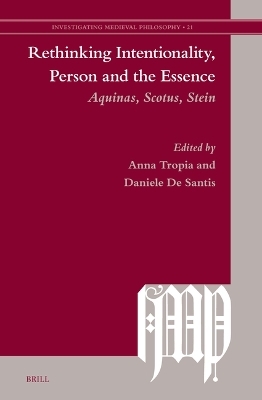
Rethinking Intentionality, Person and the Essence
Aquinas, Scotus, Stein
Seiten
2024
Brill (Verlag)
978-90-04-69345-6 (ISBN)
Brill (Verlag)
978-90-04-69345-6 (ISBN)
The volume offers a series of systematic studies on the concepts of intentionality, essence and person in medieval philosophy and phenomenology, with special focus on Aquinas, Scotus and Edith Stein.
What is the relationship between the concept of person and the concept of intentionality? Is the phenomenological notion of essence somehow related to that of medieval philosophies? What kind of entity is the person understood in her irreducible singularity? These are some of the questions that the chapters in this book seek to address and develop by focusing on the thought of Aquinas, Scotus and Edith Stein.
Indeed, the editors of the book are led by the conviction that a fruitful dialogue between medieval philosophy and 20th century phenomenology may prove useful in addressing questions and problems that are still relevant in contemporary debates. The book is divided into three sections, devoted respectively to medieval philosophy, phenomenology and some of the possible systematic and historical intersections between them.
Contributors are Sarah Borden Sharkey, Antonio Calcagno, Therese Cory, Daniele De Santis, Andrew LaZella, Dominik Perler, Giorgio Pini, Francesco Valerio Tommasi, Anna Tropia, and Ingrid Vendrell Ferran.
What is the relationship between the concept of person and the concept of intentionality? Is the phenomenological notion of essence somehow related to that of medieval philosophies? What kind of entity is the person understood in her irreducible singularity? These are some of the questions that the chapters in this book seek to address and develop by focusing on the thought of Aquinas, Scotus and Edith Stein.
Indeed, the editors of the book are led by the conviction that a fruitful dialogue between medieval philosophy and 20th century phenomenology may prove useful in addressing questions and problems that are still relevant in contemporary debates. The book is divided into three sections, devoted respectively to medieval philosophy, phenomenology and some of the possible systematic and historical intersections between them.
Contributors are Sarah Borden Sharkey, Antonio Calcagno, Therese Cory, Daniele De Santis, Andrew LaZella, Dominik Perler, Giorgio Pini, Francesco Valerio Tommasi, Anna Tropia, and Ingrid Vendrell Ferran.
Anna Tropia, Ph.D. (Macerata, 2011), is Assistant Professor at Charles University. Former Humboldt Fellow, she has widely published on the theory of cognition in medieval and early modern philosophers. In 2020, she has published the monograph Francisco Macedo. Un filosofo tra Tommaso e Scoto (Rome, Carocci). Daniele De Santis, Ph.D. (Rome, 2013), is Associate Professor at Charles University, Prague. He has published extensively on phenomenology and the history of philosophy. He is the editor in chief of The New Yearbook for Phenomenology and Phenomenological Philosophy (Routledge) and has recently published the monograph Transcendental Idealism and Metaphysics. Husserl’s Critique of Heidegger. Two Volumes (Springer, 2023).
| Erscheinungsdatum | 12.03.2024 |
|---|---|
| Reihe/Serie | Investigating Medieval Philosophy ; 21 |
| Verlagsort | Leiden |
| Sprache | englisch |
| Maße | 155 x 235 mm |
| Gewicht | 547 g |
| Themenwelt | Geschichte ► Allgemeine Geschichte ► Mittelalter |
| Geisteswissenschaften ► Geschichte ► Regional- / Ländergeschichte | |
| Geisteswissenschaften ► Philosophie ► Philosophie des Mittelalters | |
| ISBN-10 | 90-04-69345-9 / 9004693459 |
| ISBN-13 | 978-90-04-69345-6 / 9789004693456 |
| Zustand | Neuware |
| Haben Sie eine Frage zum Produkt? |
Mehr entdecken
aus dem Bereich
aus dem Bereich
eine neue Geschichte des Mittelalters
Buch | Hardcover (2023)
C.H.Beck (Verlag)
CHF 53,20


